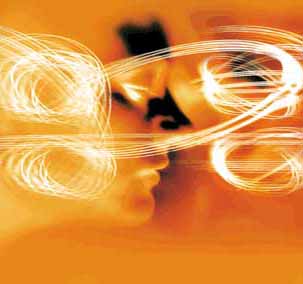For instance, this morning I stood in the shower shaving and I thought about a friend's tattoo, what it meant and how we both thought it would make a great name for a publishing company. Then, my head twirled and I saw myself there, shaving and recalling the tattoo, followed by me telling my wife I had just had déjà vu. She asked me what it was about, then we got into an argument over it. This wasn't speculation, either; I saw it all as though I did this before, then went back in time to prevent the argument from ever happening. So, I resolved not to say anything, to let this moment pass and to change the course of the future.
The term déjà vu was first used by psychic phenomena researcher Emilie Boirac in the mid nineteenth-century. Later researchers pinned the sensation on epileptics. But it wasn't until Dr. Arthur Funkhouser came along in the twentieth century that the scientific community really bit into this "strange feeling." Funkhouser broke the experience down into three types: déjà vecu (already experienced or lived through), déjà senti (already felt), and déjà visite (already visited). I most prominently experience déjà vecu, and this type allows me to alter the future, for I've already been there and know how to keep conflict from occurring.

Is déjà vu a form of time travel? Is this some way to avoid conflicts or hasty decisions that lead to trouble? Or, is déjà vu actually a junction between alternate realities? Think about it; how often have you thought "if only I had(n't)..."? Is déjà vu a time loop or glimpse into a parallel reality?
Quantum Physics has taught us that all things are possible, that our detection or projection of an event is what brings it into reality; all things possible, only our perception makes them real.
Imagine an afghan, or some knitted blanket, spanning out before you. Pick any one thread and follow it for as long as you can before running into a place where it crosses over or knots into an adjoining thread. Do you continue along the path of the thread you've already been traveling, or do you hop onto the neighboring thread that takes you to a completely different part of the blanket that is your life?



2 comments:
I'm a doubting Thomas on this topic... I think there may well be a simple, rational explanation: a temporary snafu in the brain between short-term and long-term memory.
So, you're in the shower, actively recording short term memories. For some reason we can't explain your brain also CCs the memory files to long term memory, at blazing snyoptic speed, so fast that as you living in the moment of short-term memory you seem to also be remembering a long-term memory that actually isn't long-term, it's just a copy.
That, or a glitch in the matrix.
Robert
It's interesting that you bring up the whole memory issue, Robert. This has been the normative thinking on the subject of deja vu until very recently. Not to discount anything you've said, but I believe memories are somewhat key to the phenomena.
Post a Comment